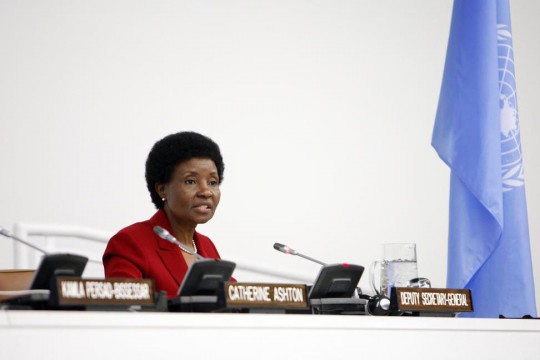Migiro calls on nations to continue fight against racism and xenophobia
Migiro calls on nations to continue fight against racism and xenophobia
 Deputy Secretary-General Asha-Rose Migiro. UN Photo/Rick Bajornas
Deputy Secretary-General Asha-Rose Migiro. UN Photo/Rick Bajornas
Countries must boost their efforts to combat systematic discrimination, Deputy Secretary-General Asha-Rose Migiro said today while urging States to continue to combat racism, xenophobia and intolerance.
In her remarks marking the closure of the International Year for People of African Descent, Ms. Migiro stressed that “the legacy of slavery still affects millions of people of African descent around the world. In many cases, even when the old structures that institutionalized racism are gone, the after-effects still cause damage.”
Ms. Migiro praised the progress made since the World Conference on Racism in Durban, South Africa, was held 10 years ago, saying this should encourage countries to continue to work on this issue.
“States have strengthened constitutional protections. They had adopted legislation and action plans to fight racial discrimination.
“In some cases, for the first time, societies recognized the very existence of people of African descent. This may be difficult to fathom, but just a few years back, these people were all but invisible in the countries where they lives, raised their children and contributed their labour.”
Ms. Migiro said she was pleased with advances made over the past year, pointing to the General Assembly’s adoption in September of a consensus text against racism, racial discrimination, xenophobia and related intolerance.
“Now is the time to look ahead and explore what more we can do,” she said. “Change takes political will. It requires education and activism. And it depends crucially on concerned individuals who join hands in common cause.
“Today we close the International Year for People of African Descent. But we should also open a new chapter in our advocacy for their rights,” she added.
High Commissioner for Human Rights Navi Pillay also highlighted the achievements over the past year, and stressed that “the International Year for People of African Descent should not be seen as an end in itself,” but instead countries should keep up the momentum.
In her remarks, delivered by Assistant Secretary-General for Human Rights Ivan Šimonoviæ,
Ms. Pillay emphasized that countries need to recognize and acknowledge the problems faced by people of African descent so they can properly respond to them. In addition, she said States should combat the impunity for racist practices that target them and ensure that they can access justice and receive equal protection from the law.
Ms. Pillay urged countries to continue their work to combat racism, stating this is a worthy long-term process.
“The road to a world free of racism is not an easy one. Anti-discrimination work is a long-term process. It requires commitment and persistence,” she said.
“People of African descent need encouragement and support. Member States have the moral and legal obligation to provide sustained political and financial backing to continue our path toward equal and just societies,” she added.
###
> United Nations (UN).
 The United Nations was established on 24 October 1945 by 51 countries committed to preserving peace through international cooperation and collective security. Today, nearly every nation in the world belongs to the UN: membership totals 192 countries.
The United Nations was established on 24 October 1945 by 51 countries committed to preserving peace through international cooperation and collective security. Today, nearly every nation in the world belongs to the UN: membership totals 192 countries.
When States become Members of the United Nations, they agree to accept the obligations of the UN Charter, an international treaty that sets out basic principles of international relations. According to the Charter, the UN has four purposes:
- to maintain international peace and security;
- to develop friendly relations among nations;
- to cooperate in solving international problems and in promoting respect for human rights;
- and to be a centre for harmonizing the actions of nations.
###
* The above story is adapted from materials provided by United Nations (UN)
** More information at United Nations (UN)




















